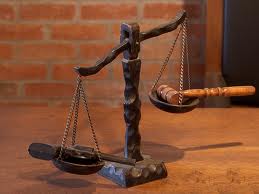|
Don't Forget The Judges - They administer and interpret the Law
Have you ever wondered what it would be like to be a judge? There are various courts in UK – the Crown court, the High Court or the County Court for example. Each has a specific role, but what is certain in each situation is that the judge is expected to administer the law of the country impartially and not according to his/her inclinations.
Some years ago, I had to appear before a judge in a civil matter and it was obvious that I had been incorrectly advised. This advice led to a debt of several thousand pounds. But, according to the law, I was the one at fault and had to pay up. How God met that situation is another story. I sensed the judge’s unspoken sympathy, but he had to do what the law required. This is when I realised that there can be a difference between the law and justice.
Then there are occasions when a law is passed by the Government to meet a particular situation, but there are unexpected ‘knock on’ effects. Perhaps we have spent a lot of time praying for our Government that the laws will be good and just.  But have we prayed for the judges? Much responsibility rests on their shoulders to interpret and administer the law. Judges are also people. Maybe there are ambiguities so that a law is open to more than one interpretation? What other dilemmas unknown to the general public could a judge have to face? Whatever their personal feelings, ideals or thoughts, they are required to be impartial, without bias, and administer the law justly. But have we prayed for the judges? Much responsibility rests on their shoulders to interpret and administer the law. Judges are also people. Maybe there are ambiguities so that a law is open to more than one interpretation? What other dilemmas unknown to the general public could a judge have to face? Whatever their personal feelings, ideals or thoughts, they are required to be impartial, without bias, and administer the law justly.
At the time of writing, we have an example of the effect of a judicial ruling. This is in the matter of The Named Person Scheme. The scheme would have allowed for the sharing of sensitive personal information without consent. The rights of parents and children would have been undermined. It was judges at the UK Supreme Court who ruled that the scheme would be in contravention of human rights. The scheme must now be either dropped or amended to make it compliant with human rights.
What should we look for in a judge and how can we pray for judges? The Bible is a wonderful source of information. See what Solomon, who is known as the wisest man of all time, prayed at the beginning of his reign.
His words recorded in 1 Kings 3:9 are eloquent. "Therefore give to Your servant an understanding heart to judge Your people, that I may discern between good and evil."
And then in 2 Chronicles 1:10: "Now give me wisdom and knowledge, that I may go out and come in before this people."
It is the prophet Isaiah who recorded a desperate situation in Israel’s history when judges were corrupt.
Isaiah 59:8-9: "The way of peace they have not known, and there is no justice in their ways; they have made themselves crooked paths; whoever takes that way shall not know peace. Therefore justice is far from us, nor does righteousness overtake us; we look for light, but there is darkness! for brightness, but we walk in blackness!"
Corrupt judges can bring a country to its knees as is obvious in Isaiah’s description. Judges need our prayers. Prayer is more powerful than most of us are aware. We can pray that our judges will be:
-
Godly: Psalm 37:4-5
-
Wise: Psalm 2:10
-
Righteous: Psalm 19:9
-
Trustworthy: Deuteronomy 1:16
A godly judge knows that one day, he will stand before the Eternal Judge. Like King David of old may he be able to say: "Judge me, O LORD, For I have walked in my integrity. I have also trusted in the LORD; therefore I shall not slide." Psalms 26:1 (NKJV).
Judges need our prayerful support, so let us pray.
June Freudenburg
(This article first appeared in "Directions")
|
June Freudenberg, 18/11/2016
|
|
| | | |
|